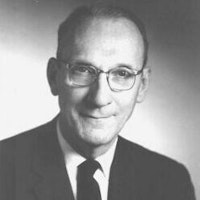A particular strength of servant-leadership is that it encourages everyone to actively seek opportunities to both serve and lead others…
Robert K. Greenleaf

To Both Serve and Lead
Topic: Serving Others
A particular strength of servant-leadership is that it encourages everyone to actively seek opportunities to both serve and lead others, thereby setting up the potential for raising the quality of life throughout society. This is a vision of a society in which the quality of life is raised for all, and the least privileged are not further deprived. It is a vision of a society in which the institutions that exist to serve people are themselves servant-led, and thus more likely to be effective in their service.
Robert K. Greenleaf (1904–1990) was the founder of the modern Servant leadership movement and the Greenleaf Center for Servant Leadership.
Robert K. Greenleaf was born on September 14, 1904, in Terre Haute, Indiana, a time marked by industrial growth and societal shifts. His upbringing in the Midwest instilled a community-oriented outlook, shaping his future ideologies on leadership and management. Greenleaf's education at Carleton College, where he studied mathematics and physics, honed his analytical abilities and sparked his interest in leadership ethics and societal structures, foreshadowing his contributions to organizational leadership.
In his career at AT&T, Greenleaf observed the limitations of traditional leadership models, particularly the neglect of individual growth within organizations. His interactions with notable figures like Rabbi Abraham Heschel and Norman Vincent Peale deepened his understanding of leadership. Greenleaf's diverse interests, including music and photography, enriched his perspective on creativity and leadership. These experiences laid the foundation for his servant-leadership theory, which posits effective leaders as those who serve the needs of their teams and communities first.
Greenleaf's 1970 essay "The Servant as Leader" introduced the revolutionary concept of servant-leadership, advocating for leaders who prioritize their team's welfare. This philosophy, derived from his professional observations and personal reflections, addresses leadership's role in nurturing younger generations and the broader society. Greenleaf's writings, focusing on integrity and individual action, underscore the importance of spiritual and moral development in leadership. His legacy, influencing various sectors, continues to champion the spirit over knowledge as the true source of power, urging for visionary leadership that remains pertinent today.
Servant Leadership
Greenleaf, Robert K. The Power of Servant Leadership: a Series of Addresses and a Personal Testimony. Berrett-Koehler Publishers, 1998, [Robert K. Greenleaf, The Power of Servant-Leadership, Vision for Our Times: Where Is It?]

Robert K. Greenleaf
Theme: Serving

About This Robert K. Greenleaf Quotation [Commentary]
Robert K. Greenleaf identifies “a particular strength of servant-leadership” as its ability to “encourage everyone to actively seek opportunities to both serve and lead others.” This is not a model of leadership limited to hierarchy or formal authority. Greenleaf emphasizes participation—everyone is invited. The call to serve and lead is intertwined, offering each person a way to contribute meaningfully. Leadership begins not in command, but in the “opportunities” to serve, making it accessible, grounded, and shared.
Greenleaf extends this idea to its broader social implications. When people respond to the call to serve and lead, they “set up the potential for raising the quality of life throughout society.” The goal is not individual success but a collective uplift. He imagines “a society in which the quality of life is raised for all, and the least privileged are not further deprived.” Servant-leadership becomes a way of restructuring society so that care and inclusion reach those most in need. It begins with personal action but extends to social consequence.
Institutions, too, are part of this vision. Greenleaf writes of “a society in which the institutions that exist to serve people are themselves servant-led.” The principle of service must animate the systems that shape our common life. When institutions are led by those committed to serving, they are “more likely to be effective in their service.” This approach to leadership calls for integrity at every level—from the individual to the institutional—and holds that true leadership begins with the choice to serve.
Robert K. Greenleaf, The Servant As Leader [Excerpt]
Greenleaf’s seminal essay The Servant as Leader was published in 1970. In it, he proposed that the best leaders were servants first, and the key tools for a servant-leader included listening, persuasion, access to intuition and foresight, use of language, and pragmatic measurements of outcomes. In the next four years, two more essays explored ideas that an entire institution—and a society—could act as servant, and that trustees should act as servants. In 1976, Paulist Press published Servant Leadership, a book that combined these and other essays. Greenleaf always claimed that although he was informed by the Judeo-Christian ethic (he became a Quaker in mid-life), servant leadership was for people of all faiths and all institutions, secular and religious. He knew that he was not a perfect servant-leader, but it was his ideal, and the arc of his life bent in that direction.
Along the way, Bob and Esther made friends with luminaries of their day like Rabbi Abraham Heschel, Norman Vincent Peale, Peter Drucker, Jungian analyst Ira Progoff , semanticist Alfred Korzybski, and hundreds of others. Bob loved to sing bass, attend lectures and concerts, play the recorder, read, fly giant kites, and take and develop pictures. His work and writings continue to have an impact on fields as diverse as systems thinking, management, leadership, organizational development, religion, assessment and evaluation, and a baker’s dozen other disciplines. Greenleaf, however, did not describe himself a philosopher, academic, theologian or writer, but as a businessman and a seeker. He died in 1990 and is buried in Terre Haute, Indiana, with an epitaph that shows his wit: “Potentially a good plumber; ruined by a sophisticated education.”
–Don M. Frick [The biographer of Robert K. Greenleaf].
Additional Robert K. Greenleaf Quotes
Resources
Related Quotes
Copyright © 2017 – 2026 LuminaryQuotes.com About Us